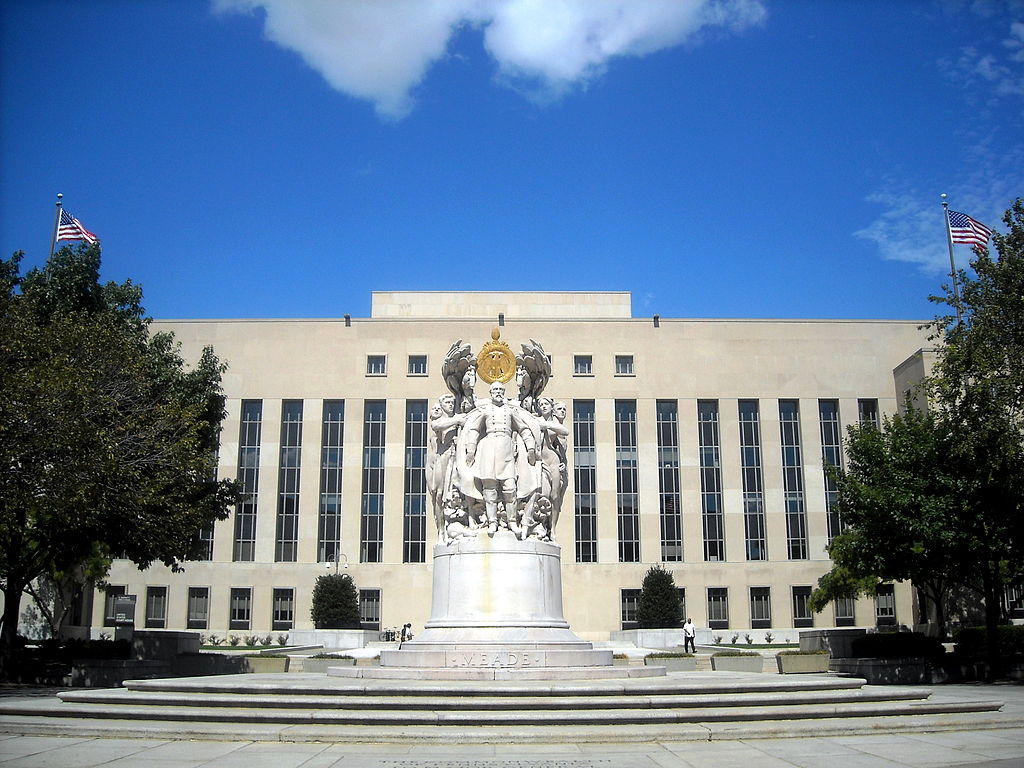Seven Frequently Asked Mueller Indictment Questions for Which We Don’t Have the Answers
Let’s start with what we know about the indictment in the Mueller investigation.
Late last night, CNN broke the bombshell story that Friday afternoon, the first charges in the Special Counsel Robert Mueller’s investigation were filed:
A federal grand jury in Washington, DC, on Friday approved the first charges in the investigation led by special counsel Robert Mueller, according to sources briefed on the matter.

Published by The Lawfare Institute
in Cooperation With

Let’s start with what we know about the indictment in the Mueller investigation.
Late last night, CNN broke the bombshell story that Friday afternoon, the first charges in the Special Counsel Robert Mueller’s investigation were filed:
A federal grand jury in Washington, DC, on Friday approved the first charges in the investigation led by special counsel Robert Mueller, according to sources briefed on the matter.
The charges are still sealed under orders from a federal judge. Plans were prepared Friday for anyone charged to be taken into custody as soon as Monday, the sources said. It is unclear what the charges are.
Reuters and the Wall Street Journal confirmed the report shortly thereafter.
In short, someone under investigation in the Mueller investigation appears to have been indicted for something and may be arrested at some point.
End of list.
And while that alone is a genuine bombshell, the much more important point at this stage is how little we do know and, thus, how few conclusions we can reasonably draw at this point. Below is effort to walk through the many unanswered questions that are kicking around today. Our intention here to emphasize how little we can responsibly say about it and guide people away from getting too far ahead of the story.
Toward that end, here are seven frequently asked questions we don’t know the answer to.
Who is Being Charged and For What?
We don’t know and we don’t know.
Typically, when the public becomes aware of an indictment, we also learn the name of the individual defendants and the nature of the charges that have been filed. Here we haven’t yet learned either.
The closest we can get to answering this question is to give a sense of the universe of possible charges and known subjects of the investigation. The scope of Mueller’s investigation is not only the Russian election interference probe—which includes any possible coordination between Russian agents and the Trump campaign—but also anything arising in the course of that inquiry. That means we’re potentially looking at a wide range of people and an even wider range of possible charges—some of which may be wholly unrelated to President Trump or the campaign itself but may simply involve criminal activity exposed in the course of investigating possible coordination.
Recent news reports regarding the grand jury have largely focused on former Trump campaign chairman Paul Manafort and former National Security Advisor Michael Flynn. So the defendant could be one (or less likely, both) of them. But it could also be any number of people around either of them in an effort to put pressure on them to cooperate. And Mueller is also clearly looking at some of the underlying business deals of the Trump Organization. So the range of possibilities is actually large.
Early in October, CNN and the Wall Street Journal reported that Paul Manafort had been the target of US government surveillance—though the two outlets did not agree on the nature of that surveillance or the authority under which it was conducted. The Journal and other news outlets have also reported Manafort is the subject of a money laundering probe. Politico has the news yesterday that Manafort’s realtor has appeared before the grand jury, and a few weeks back his spokesperson Jason Maloni also reportedly testified.
That said, there are a few things it’s reasonable to assume the indictment is not about. Specifically, it appears that the obstruction of justice investigation begun when FBI Director James Comey was fired is in all likelihood not advanced enough to be producing indictments yet—if it ever will. And it seems unlikely (at least to us) to be focused on core “collusion” allegations at this stage. So look for it to involve criminal allegations that are related to the core of the investigation’s concerns largely in terms of who they involve—not the specific conduct they allege.
Who is putting this story out there?
We don’t know. But there is some suggestive wording in the stories.
All three outlets go with the decidedly vague “sources briefed on the matter.” It’s hard to come up with many classes of people who would be briefed on this at this early stage. For one thing, the indictment is reportedly a sealed matter before a grand jury, and therefore the defense bar—a common source of proper disclosures of grand jury information—would have no reason to know about it. It seems unlikely Congress would have been briefed at this stage either. The nature of the term “briefed” suggests we are not dealing with Mueller’s staff, who wouldn’t need to be briefed on their own investigation, or court staff before whom the matter takes place. The only obvious group of people who would have been “briefed” are the deputy attorney general and his staff at the Department of Justice.
In lieu of sourcing specifics, CNN does offer an account of how it came to be tipped off that something was up. To wit, someone happened to run into Andrew Weissman at the courthouse:
On Friday, top lawyers who are helping to lead the Mueller probe, including veteran prosecutor Andrew Weissmann, were seen entering the court room at the DC federal court where the grand jury meets to hear testimony in the Russia investigation.
Reporters present saw a flurry of activity at the grand jury room, but officials made no announcements.
We strongly doubt Weissman gave CNN a wink and sang “Indictment time!” as he walked out.
So based on both the text of the story and the likely pool of people in the know, this is most probably a law enforcement leak—at least in terms of confirmation of what was going on—and one that came from the Justice Department.
And it’s a bad one. For obvious reasons, the FBI doesn’t usually let people know they plan to arrest them. That can allow people to flee. It can also allow destruction of evidence or moving of assets. So while it’s possible that arrests will take place Monday, as the stories suggest, don’t be too surprised if the fact of the story’s leaking accelerates law enforcement plans.
Is Mueller trying to get someone to flip?
We don’t know. But it seems likely.
Mueller could well have sought an indictment in hopes of mounting pressure on an individual he hopes will cooperate. Or he could have just reached a point where he believes he has enough evidence to prove charges in court as an end in itself. Or both could be true. There’s been a lot of dueling chatter on whether Mueller is moving too fast or too slow or both. All we can say is that he’s moving on his own schedule.
Did the Trump team know in advance?
We don’t know. But it seems unlikely.
The past week has seen a flurry of stories related—bizarrely enough—to Hillary Clinton. The White House tried to make hay out of a story that the DNC and the Clinton campaign at some point paid for a portion of the infamous dossier. But that Democratic actors paid for the later parts of Christopher Steele’s research and Republican sources paid for the earlier parts has been known for months and isn’t particularly relevant to Russia investigation generally. Then conservative media descended on the purported Uranium One scandal, which Paul Rozensweig takes on here.
This has caused many commentators to speculate that the Trump team knew this indictment was coming ahead of time and engaged in a coordinated distraction effort.
Count us skeptical. There’s no reason the White House should have been aware of the timing of the pending indictment; indeed, it would likely be highly improper if the Trump team did know. What’s more, there isn’t really any evidence of any specific knowledge. Certainly, the Trump camp has close ties to certain individuals under scrutiny and is monitoring developments related to the case closely. It’s entirely possible it had picked up other indications that the case was ramping up. And while the current wave of stories does appear to be a coordinated effort at distraction from the Mueller investigation generally, the timing doesn’t suggest any specific foreknowledge. Indeed, Politico is reporting this afternoon that “President Donald Trump, his lawyers and senior administration officials were all caught off guard by the news” that an actual indictment has materialized.
Is Mueller’s timing related to Trump’s tweets?
We don’t know. But please. Of course not.
Trump has been tweeting about the “costly” investigation, implying it is soon coming to an end. In light of the mercurial and reckless Commander in Chief, Mueller would be wise to conduct each week of the investigation as if it might be the last. But there is nothing to suggest any part of the investigation timeline is responsive to Trump’s tweets or to White House statements.
Is the resignation of Dana Boente related to any of this?
We don’t know. But probably not.
Friday also brought the news that Dana Boente planned to step down. Boente is the former Acting Attorney General, current acting Deputy Attorney General for National Security, and when he’s not doing those things, the U.S. Attorney for the Eastern District of Virginia. His announcement came as a surprise and lead to speculation that the timing was somehow related either to the indictment or to the public disclosure of the indictment.
But Boente didn’t march out of the building, never to return. He announced that he plans to step down once his successor was confirmed. The only real surprise is that he doesn’t intend to return to the Eastern District of Virginia, which some reports suggest was his plan until recently. There are a whole lot of reasons why someone might change their career plans, even somewhat abruptly. Ending a thirty year career with a criminal leak ranks relatively low on the list of likely explanations. And while it’s certainly possible that Boente was forced out, it’s not clear what that would have to do with the indictment. What happened to Boente is certainly worth finding out. And given President Trump’s treatment of other U.S. Attorneys and senior Justice Department officials, it’s well worth making sure the circumstances of his departure are not untoward. But not everything that happens the same day is connected. And we have no reason at this stage to believe that Boente’s resignation is connected to Mueller’s move.
What does this mean for the future of the Russia investigation?
You’ll sense a pattern emerging here: We don’t know. Neither does anyone else. Once the specifics of the indictment are made public more—though certainly not all—may become clear on this score.
At this stage, only one thing seems really safe to say: this development means that Mueller’s investigation isn’t going away anytime soon. Indictments typically mark the beginning of a lengthy litigation process. They seldom mark an investigation’s end.





